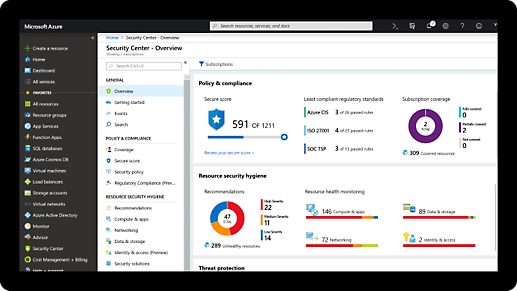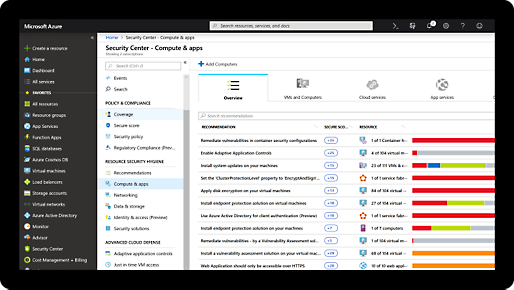Easily migrate your SQL Server apps to the cloud
Part of the Azure SQL family, SQL Managed Instance is an intelligent cloud database service combining the broadest SQL Server engine compatibility (back to SQL Server 2008) with the benefits of a fully managed, up-to-date platform as a service. With your successful assessment on Azure Migrate or Azure Data Studio, confidently modernize your custom and vendor-provided apps to Azure.
The broadest SQL Server engine compatibility accelerates modernization to Azure
Savings of up to 55 percent compared to pay-as-you-go pricing when you reuse your SQL licenses with Azure Hybrid Benefit1
Hybrid flexibility with the link feature and Azure Arc-enabled data services brings cloud connectivity and Azure innovation on premises
Always operate on the latest version of SQL
Stop worrying about updates, upgrades, or end of support. SQL Managed Instance is built on the SQL Server engine, so it's always up to date with the latest SQL features and functionality.


Optimize price-performance and lower your costs
Meet your mission-critical requirements up to five times faster while paying up to 93 percent less than AWS RDS.2 Learn how SQL Managed Instance outperformed across three different benchmarks, spanning transactional and analytics workloads.
Maintain SQL Server compatibility
Accelerate application modernization with the latest managed SQL Server capabilities in the cloud. Keep using familiar tools and SQL Server features like cross-database queries, linked server, and support for Windows authentication with an entire SQL Server instance within a managed service. Move your custom and vendor-provided apps without worrying about compatibility or performance changes—SQL Managed Instance maintains the highest SQL Server compatibility levels.


Increase database administrator productivity
Boost productivity and operate more efficiently by letting the fully managed service perform time-consuming and complex tasks on your behalf. Take advantage of built-in high availability, accelerated database recovery, and automated backups to help ensure that your data is available when you need it, and use AI-powered automatic tuning to optimize performance. Get the best of SQL Server with the financial and operational benefits of a platform as a service.

Fully isolate and secure your data
Achieve isolation at both the compute level and the network level. Ensure that your instances and databases don't share virtual machines with other customers. Keep workloads fully contained within a secure native virtual network, and get the benefits of the public cloud while remaining isolated from the public internet.
Comprehensive security and compliance, built in
-
Microsoft invests more than USD1 billion annually on cybersecurity research and development.



-
We employ more than 3,500 security experts dedicated to data security and privacy.

-
Azure has more certifications than any other cloud provider. View the comprehensive list.

Pricing for the always-up-to-date SQL instance in the cloud
Explore pricing options and find the one that fits your workload.
Get started with an Azure free account
1

2

After your credit, move to pay as you go to keep building with the same free services. Pay only if you use more than your free monthly amounts.
3

Trusted by companies of all sizes
Achieving breakthrough performance and savings
Learn how Komatsu Australia reduced costs by 49 percent and increased performance by up to 30 percent by migrating its data to SQL Managed Instance.

Supporting growth and flexibility
Learn how Descartes benefited from fully managed SQL Managed Instance and successfully met the high transaction demands of its MacroPoint app.

Maximizing vaccine accessibility through scalability
Learn how Mosaic Life Care used SQL Managed Instance to enable easy access to COVID-19 vaccinations and reduce its IT administrative burden.

Collaborating with agility on Azure
See how Wolters Kluwer reduced its administrative tasks, saved time, and improved its overall platform availability and performance using SQL Managed Instance.

Improving business-critical applications
Learn how MCS gained operational efficiency, flexibility, and improved analytics by modernizing with SQL Managed Instance.

Reducing costs and creating new revenue streams
Learn how Epos Now migrated from AWS to SQL Managed Instance and built a new data-as-a-service revenue stream that helps customers save time and benefit from real-time insights.

Migrate to Azure SQL Managed Instance and confidently use your apps
Explore Microsoft partners that offer certified apps for SQL Managed Instance.

SQL Managed Instance resources
Documentation
Microsoft Learn
Frequently asked questions about Azure SQL Managed Instance
When you migrate from SQL Server to Azure SQL Managed Instance, you want to be sure your apps will run in the cloud without the need to make any changes. Having a higher degree of SQL Server engine compatibility means less refactoring and one less thing to worry about. The degree of compatibility is controlled by database compatibility levels, and SQL Managed Instance is set to the highest compatibility level by default, which is on par with the latest version of the SQL Server engine. In fact, SQL Managed Instance was built on the SQL Server 2016 engine, making it compatible with SQL Server engines ever since. A commitment to not retire older SQL Server engine code also makes SQL Managed Instance backward-compatible with SQL Server engines dating to 2008. Before migrating to SQL Managed Instance, use Azure Migrate or Azure Data Studio to conduct a comprehensive assessment of your data estate to confirm that your databases are ready for the cloud.
-
See the list of supported features. For differences in syntax and behavior between SQL Managed Instance and on-premises SQL Server, see T-SQL differences.
-
For available hardware generation and service tier characteristics, see the overview of technical characteristics and resource limits.
-
SQL Managed Instance offers the same performance levels per compute and storage size as Azure SQL Database. If you want to consolidate data on a single instance or you simply need a feature supported exclusively in SQL Managed Instance, migrate your data by using export and import (BACPAC) functionality.
Ready when you are—let’s set up your Azure free account
- [1] Savings based on eight vCore Managed Instance Business Critical in East US Region, running 730 hours per month. Savings are calculated from full price (license included) against base rate (applying Azure Hybrid Benefit for SQL Server), which excludes Software Assurance cost for SQL Server Enterprise edition, which may vary based on EA agreement. Actual savings may vary based on region, instance size, and performance tier. Prices as of May 2022, subject to change.
- [2] Price-performance claims based on data from a study commissioned by Microsoft and conducted by Principled Technologies in April 2022. The study compared performance and price performance between a 16 vCore, 64 vCore and 80 vCore Azure SQL Managed Instance using premium-series hardware on the business-critical service tier and the db.m6i.32xlarge, db.r5b.4xlarge and db.r5b.16xlarge offerings for Amazon Web Services Relational Database Service (AWS RDS) on SQL Server. Benchmark data is taken from a Principled Technologies report using recognized standards, HammerDB TPROC-C, HammerDB TPROC-H and Microsoft MSOLTPE, a workload derived from TPC-E. The MSOLTPE is derived from the TPC-E benchmark and as such is not comparable to published TPC-E results, as MSOLTPE results do not comply with the TPC-E Specification. The results are based on a mixture of read-only and update intensive transactions that simulate activities found in complex OLTP and analytics application environments. Price-performance is calculated by Principled Technologies as the cost of running the cloud platform continuously divided by transactions per minute or per second throughput, based upon the standard. Prices are based on publicly available US pricing in South Central US for Azure SQL Managed Instance and US East for AWS RDS as of April 2022 and incorporates Azure Hybrid Benefit for SQL Server, excluding Software Assurance and support costs. Performance and price-performance results are based upon the configurations detailed in the Principled Technologies report.







